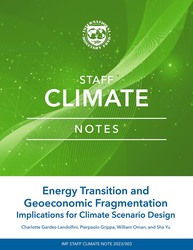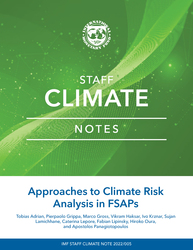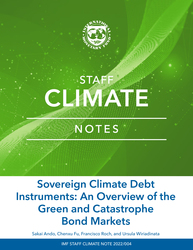
Energy Transition and Geoeconomic Fragmentation: Implications for Climate Scenario Design
Recent geoeconomic developments affect the energy transition and have implications for the design of the climate scenarios used in the financial sector to assess climate-related financial risks. The note proposes potential adjustments to climate scenarios design.
READ MORE...
Volume/Issue:
Volume 2023
Issue 003
Publication date: November 2023
ISBN: 9798400258220
$5.00
Add to Cart by clicking price of the language and format you'd like to purchase
Available Languages and Formats
| English |
Prices in red indicate formats that are not yet available but are forthcoming.
Topics covered in this book
This title contains information about the following subjects.
Click on a subject if you would like to see other titles with the same subjects.
Economics- Macroeconomics , Economics / General , Environmental Economics , Environmental Conservation and Protection , Natural Resources , Public Policy- Environmental Policy , Climate scenarios , polycrisis , climate risks , carbon lock-in , risk assessment , geoeconomic fragmentation , energy transition , energy security , disorderly transition , trade multilateralism , fossil fuel development , IMF staff climate note , IMF staff climate NOTE 2023/003 , climate scenario , Renewable energy , Climate policy , Climate change , Non-renewable resources , Global , Central America , Caribbean
Summary
The transition to a low-carbon economy, which is needed to mitigate climate change and meet the Paris Agreement temperature goals, has been affected by the supply chain and energy supply disruptions that originated during the COVID-19 pandemic, the Russian invasion of Ukraine, and the subsequent energy crisis and exacerbation of geopolitical tensions. These developments, and the broader context of the ongoing “polycrisis,” can affect future decarbonization scenarios. This reflects three main factors: (1) pullbacks in climate mitigation policies and increased carbon lock-in in fossil fuel infrastructure and policymaking; (2) the decreasing likelihood of continuous cost reduction in renewable energy technologies; and (3) the likely intensification of macroeconomic shocks amid increasing geoeconomic fragmentation, and the associated policy responses. In this context, the note assesses the implications of the polycrisis for hypothetical scenarios used to assess climate-related financial risks. Following an analysis of the channels through which these effects are likely to materialize over short- and long-term horizons and some policy implications, the note proposes potential adjustments to the design of the climate scenarios used by financial institutions, central banks, and financial sector supervisors and regulators within their risk management frameworks.
Copyright © 2010 - 2026
Powered by:
AIDC



